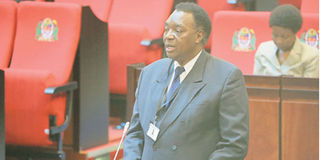Life comes full circle for Mahalu

Costituent Assembly member, Victor Costa Mahalu, airs his views during deliberations on the new draft standing orders at Parliament in Dodoma yesterday. PHOTOS | SILVAN KIWALE
What you need to know:
But controversy continues to dog the Standing Orders adopted by the CA earlier this week. The regulations only state that decisions regarding the draft constitution will be made through a vote without specifying the type of ballot to be used.
Dodoma. Many Tanzanians first knew him after he was charged with abuse of office in a case that eventually ended in his acquittal after dragging on for several years.
Prof Costa Ricky Mahalu was charged in 2007 along with former embassy official Grace Martin with forging documents and occasioning the government a loss of Sh2.5 billion when he was Tanzania’s ambassador to Italy in 2002.
On August 9, 2012, Prof Mahalu walked out of the Kisutu Resident Magistrate’s Court in Dar es Salaam a free man after he was acquitted of all charges, five years after he first appeared in court.
Less than two years after his acquittal, Prof Mahalu, one of Tanzania’s top legal minds, has found himself playing a key role in the rewriting of the country’s constitution following his appointment to chair the committee tasked with drawing up the Constituent Assembly’s Standing Orders.
It is difficult to talk about the achievements of the CA so far without mentioning Prof Mahalu’s name. Whereas experience from elsewhere shows that some countries spend up to six months drafting regulations for their constituent assemblies, the 20-member team led by Prof Mahalu drew up CA regulations in only three weeks.
But it was not a simple task. “I prayed a lot to ask God to enable and give us strength to work together. Remember that our committee was made up of people from different backgrounds,” he told The Citizen, shortly after his team accomplished its task on Tuesday. Prof Mahalu says teamwork is another factor which helped the committee to deliver within a relatively short time. “We worked as a team. When we were appointed, I knew some of the members and didn’t know others. But in the course of our work, I got to know and understand almost all of them,” he says.
He adds that they made history through dedication and teamwork, noting, however, that it was not all smooth sailing as members often differed before finding common ground through consensus.
Committee members put aside their political and other interests and focused on the task the CA had entrusted them with. “I’m happy that there was a high level of cooperation within the committee, and it is my hope that this spirit will prevail during the Constituent Assembly’s tenure and beyond,” says Prof Mahalu.
He is philosophical about the fierce criticism directed at his committee by some CA members, who accused the team of, among other things, bias and attempting to protect narrow political interests.
“There was a time when we weren’t reading from the same script, but I have put that behind me. I believe that members have forgiven my committee for any mistakes we made on the way,” he says.
Despite the numerous challenges the committee faced, Prof Mahalu says he enjoyed working with the team, adding that his initial fears of failure turned out to be just that – fears.
“At first I was a bit worried because the committee comprised people from diverse political, social and professional backgrounds, but I came to realise later that there was strength in diversity. I knew that we could turn the diversity to our advantage and come up with regulations that will cater for the interests of all groups,” he says.
But controversy continues to dog the Standing Orders adopted by the CA earlier this week. The regulations only state that decisions regarding the draft constitution will be made through a vote without specifying the type of ballot to be used. It has been left to the assembly to decide whether to use the secret or open ballot when voting.
The voting mode was the most divisive issue during the debate on the standing orders, with members being split between the secret and open ballots.
But Prof Mahalu says the committee’s decision is the best option in the prevailing circumstances.
“If you look at this issue legally, there is no problem with its interpretation. The secret and open ballots are all modes of making decisions which are acceptable in a democratic setting. The committee was not able to make a firm decision because members are still divided. We decided to settle for what we proposed because we didn’t want to waste too much time on one issue,” he says.
Prof Mahalu says although many people have accused his committee of seeking to push political and other agenda, it did not come under pressure from any group, adding that the team worked independently to finish its work in record time.
He says diverse views enrich democracy, and what is important is for various groups to reach a consensus to enable the nation to move forward.
Prof Mahalu urged CA members to emulate his committee and work as a team, saying cooperation is key to ensuring the assembly succeeds.
“We should temporarily forget our political and other interests because we are writing a constitution for the nation,” he says.
Short profile.
Prof Costa Ricky Mahalu was born on July 9, 1948 at Katunguru Village in Sengerema District, Geita Region. The region was then in the former Lake Province. After completing his primary education, Mahalu joined Kibaha Secondary School, where he completed ordinary level of secondary education before joining Mkwawa High School.
In 1971, he joined Makutupora National Service Camp in Dodoma for basic military training before enrolling at the University of Dar es Salaam (UDSM) from where he graduated with a law degree in 1974.
In 1975, Mahalu was employed by UDSM as assistant lecturer in the Faculty of Law. He studied for his second law degree from 1976 to 1978 while still teaching at the university. In 1979, he went to Hamburg, West Germany, where he obtained a doctorate degree in 1983. He then returned to UDSM and was promoted to senior lecturer.
In 1990, he went to Germany where he was employed as a lecturer, but returned to UDSM after one year and was appointed law professor. After working for one and a half years, he was appointed Director for Higher Education, a post which served in from 1992 to 1996.
In October 1996, he was transferred to the Foreign Affairs ministry, and was later posted to Germany as an assistant to the ambassador. In 1999, he was appointed Tanzania’s ambassador to Italy, where he served from 2000 to 2006.
Prof Mahalu currently works as a law lecturer at the St Augustine University of Tanzania.




